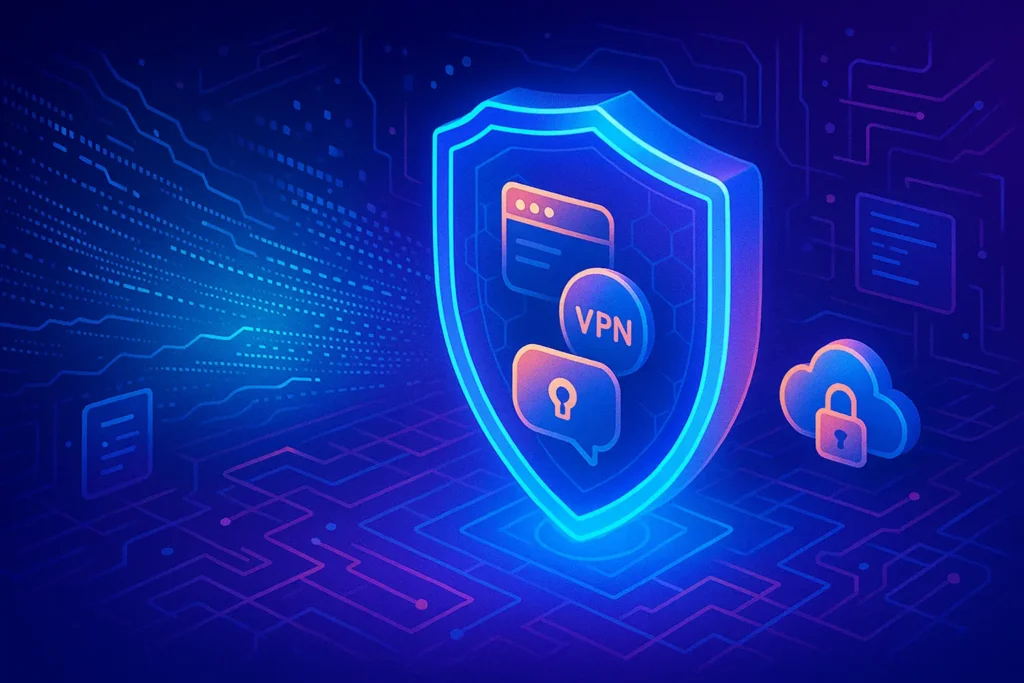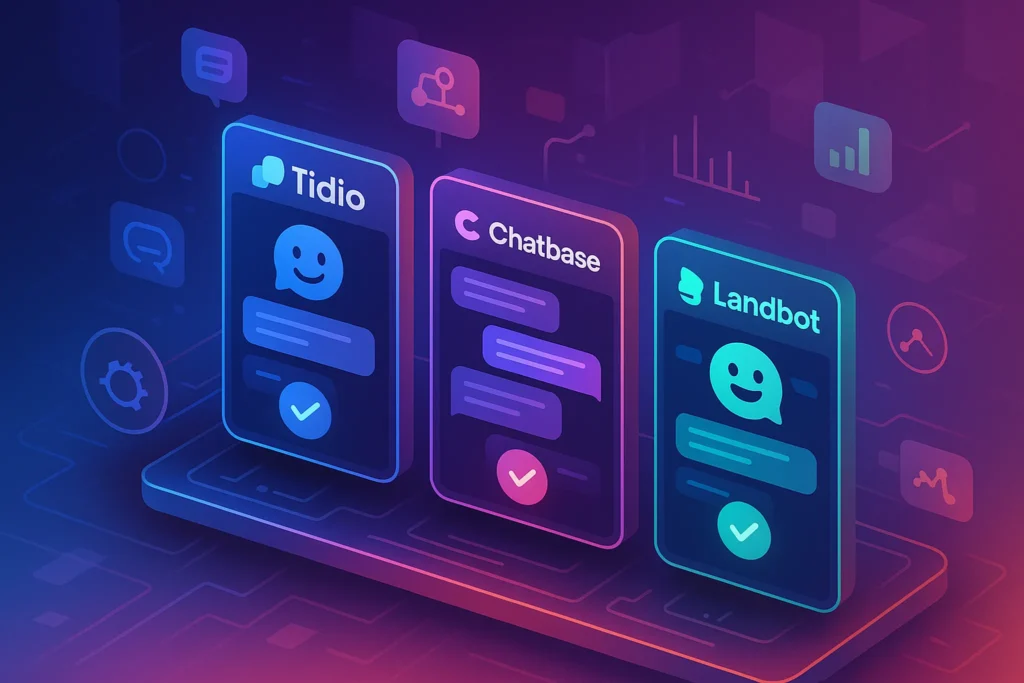🔒 Why Everyday Privacy Matters More Than Ever
In 2025, online privacy is no longer a niche concern—it’s a daily necessity. Data breaches, trackers hidden in websites, cookies that follow your every move, and phishing attempts powered by AI are eroding the sense of security people once had online. According to a 2024 IBM report, the global average cost of a data breach hit $4.45 million, and while those numbers often apply to enterprises, the ripple effect hits individuals too. Your passwords, browsing habits, and personal conversations are just as vulnerable.
Most cybersecurity guides focus on infrastructure or enterprise threats, but the real frontline is everyday users. That’s why at NerdChips, we’re framing this piece as an everyday privacy toolkit: the apps and extensions you can install today to secure your browsing, messaging, and storage. While our other posts—like Cybersecurity in 2025: AI-Powered Defenses and Emerging Threats—explore the macro side of security, this guide is about practical, day-to-day protection.
🌍 Privacy-Focused Browsers
Your browser is the gateway to the internet, and by default, most mainstream ones prioritize convenience over privacy. That’s why browsers like Brave and Firefox have gained traction among privacy-conscious users.
Brave blocks ads and trackers out of the box, giving you faster load times and fewer third-party scripts following you around. Its built-in Tor mode routes traffic anonymously, offering a level of browsing stealth similar to VPNs. Firefox, with its Enhanced Tracking Protection, provides a balance between usability and control. Users can install hardened privacy extensions while still enjoying mainstream compatibility.
When NerdChips tested page load speeds with Brave compared to Chrome on tracker-heavy sites, the difference was dramatic—Brave loaded 40% faster simply by stripping hidden scripts. That’s not just a performance boost, it’s a safety net against data profiling.
🛡️ VPN Apps: Shielding Your Digital Footprint
A Virtual Private Network (VPN) masks your IP address and encrypts traffic, making it harder for ISPs, hackers, or government surveillance systems to track you. Services like ProtonVPN and Mullvad stand out for their no-log policies and transparent governance.
VPNs are especially critical when using public Wi-Fi. Imagine logging into your bank account at a café; without a VPN, you’re exposing sensitive data over networks that may be compromised. A VPN creates a tunnel of encryption, protecting you from man-in-the-middle attacks.
But not all VPNs are equal. Free services often monetize through logging user activity, which defeats the point. A 2023 study revealed that 38% of free VPN apps contained malware or data-sharing clauses in their policies. If privacy is the goal, invest in a provider that’s transparent and ideally open-source.
For deeper context, pair this toolkit with Pro Tips for Securing Your Online Privacy, where we explored broader strategies beyond just VPNs.
📩 Secure Messaging Apps
Messaging is one of the most intimate digital activities, and yet most mainstream apps are data mines. Signal and Threema have become gold standards for encrypted communication. Both use end-to-end encryption, meaning only you and your recipient can read the content—not the company, not governments.
Signal has built-in features like disappearing messages and sealed sender, which hides metadata such as who messaged whom. Threema, while less mainstream, doesn’t even require a phone number to register, offering anonymity from the start.
Contrast this with WhatsApp, which, despite using end-to-end encryption, still shares metadata with its parent company Meta. That metadata—when you’re online, who you talk to, and how often—can be just as revealing as the content of messages. As one user on X wrote: “Privacy isn’t just about the words you type; it’s about the patterns you leave behind.”
Want More Smart Privacy & Security Tips?
Join the NerdChips newsletter for weekly insights into privacy apps, secure tools, and everyday digital defense strategies—delivered straight to your inbox.
100% privacy. No spam. Just value-packed advice from NerdChips.
🧩 Extensions That Guard Your Privacy
Browsers alone can’t do all the heavy lifting. Extensions like uBlock Origin, Privacy Badger, and HTTPS Everywhere provide critical layers of protection. uBlock Origin not only blocks ads but also filters out malicious domains. Privacy Badger, developed by the Electronic Frontier Foundation (EFF), learns to block trackers dynamically. HTTPS Everywhere forces sites to use secure connections whenever available, minimizing the risk of man-in-the-middle attacks.
During our NerdChips test, browsing with uBlock Origin and Privacy Badger reduced the number of third-party requests on a news site from 120 to under 20. That’s a tangible drop in how much of your data is being siphoned off with each click.
These extensions also improve browsing speed and battery life on mobile devices. Privacy isn’t just about defense; it’s about efficiency.
☁️ Cloud Storage with Zero-Knowledge Encryption
Most people store files in Google Drive, iCloud, or Dropbox without realizing that these companies technically have access to their content. Zero-knowledge encryption services like Tresorit and Proton Drive flip the model: only you have the decryption keys. Even the provider cannot read your files.
This is particularly important for sensitive documents, like tax records, personal photos, or business contracts. In case of a breach, attackers only find unreadable ciphertext.
When Dropbox was hacked in 2012, millions of user credentials leaked, proving how fragile centralized trust can be. With zero-knowledge providers, even if a breach occurs, the data remains secure because the provider doesn’t hold the keys.
Pairing encrypted storage with strong passwords (as we explored in Password Managers Compared: Which One Is Actually Safe?) creates a robust defense system for everyday users.
⚡ Ready to Try Privacy-Protecting Tools?
Apps like Brave, Signal, and ProtonVPN make data protection simple for everyday users. Don’t wait for a breach to act—equip your toolkit today.
⚠️ Common Mistakes in Privacy Protection
One of the biggest issues with online privacy isn’t the lack of tools—it’s misusing them. Many users download a VPN, install a “secure” app, and assume they’re untouchable. In reality, mistakes can undo even the strongest protections.
A frequent error is relying on free VPNs. These services often log activity or even inject ads into browsing sessions. Instead of protecting you, they become another tracker. Another common problem is storing passwords in the browser. While convenient, if your device is compromised, all saved credentials can be harvested instantly. Using a password manager is safer and integrates better with two-factor authentication.
Ignoring software updates is another silent killer. Many hacks exploit known vulnerabilities that would have been patched with regular updates. Without staying current, even Signal or Brave can’t protect you. And finally, people often neglect two-factor authentication (2FA). Strong passwords are good, but without 2FA, they’re only one leak away from compromise.
In short: privacy is a system, not a single app. Tools work best when used consistently and thoughtfully.
📱 Privacy for Mobile Devices
Most people live on their phones more than their laptops, making mobile privacy crucial. Yet smartphones are the most invasive devices we own—GPS tracking, microphone access, and background data collection all happen daily.
Apps like DuckDuckGo Privacy Browser offer private searches and automatic tracker blocking on both iOS and Android. For Android specifically, TrackerControl allows users to see which apps send data to third parties, often uncovering hidden trackers in seemingly harmless apps. On iOS, Apple’s App Tracking Transparency has given users more control, but complementing it with privacy-focused browsers and VPNs strengthens defenses further.
Permissions are another overlooked area. How many apps on your phone still have access to your camera, microphone, or location? By auditing permissions regularly and revoking unnecessary ones, you minimize data leakage. This step, combined with encrypted messengers like Signal and secure cloud storage, makes mobile devices far safer.
📊 Free vs. Paid Tools: A Comparison
Privacy often comes down to trade-offs. Free tools may seem attractive, but they frequently come with hidden costs. Here’s a breakdown that highlights the differences:
| Category | Free Tools | Paid Tools (Premium) |
|---|---|---|
| VPN | Often log user data, slower, ad-supported | No-logs, faster speeds, better encryption |
| Cloud Storage | Limited space, provider can access files | Zero-knowledge encryption, larger storage |
| Messaging | Ad-supported apps like Telegram (partially) | Signal/Threema with community-driven funding |
| Browser | Chrome/Safari with trackers | Brave/Firefox hardened with privacy add-ons |
As NerdChips has emphasized before, the right investment in security tools isn’t about luxury—it’s about protecting your long-term digital life. The cost of one data breach or identity theft often outweighs years of subscription fees.
🧠 The Psychology of Privacy: Why It Equals Freedom
Privacy isn’t just technical; it’s psychological. Knowing that your conversations, files, and browsing aren’t constantly monitored changes how you behave online. Studies in behavioral science have shown that people modify their opinions and self-expression when they feel surveilled. This phenomenon, known as the “chilling effect,” erodes authenticity.
By taking back privacy, you reclaim freedom. It’s not about hiding—it’s about owning your choices without invisible influence. At NerdChips, we believe that privacy tools empower individuals not just technically but mentally. They give you confidence to explore, learn, and communicate without hesitation.
So when you install Signal or ProtonVPN, you’re not only encrypting data—you’re liberating yourself from invisible psychological pressure.
⏱️ Mini Onboarding Guide: Start in 15 Minutes
Privacy upgrades don’t have to be overwhelming. Here’s a quick starter flow you can complete in under 15 minutes:
-
Minute 1–5: Download and set Brave as your default browser. You’ll immediately cut out trackers and ads.
-
Minute 6–10: Install Signal and invite one friend to switch conversations over. Test disappearing messages for extra control.
-
Minute 11–15: Create a Proton Drive account and upload one sensitive document. Now you’ve secured your browsing, messaging, and storage in a single session.
Once you’ve taken these small steps, layer on more advanced tools like VPNs, encrypted extensions, and zero-knowledge storage. The important thing is momentum—privacy is built one habit at a time.
🧠 Nerd Verdict
Protecting your privacy is no longer optional—it’s survival in a digital world designed to monetize your data. The good news is that everyday tools are now powerful enough to shield individuals without requiring enterprise-level infrastructure.
Browsers like Brave, messaging apps like Signal, and encrypted cloud storage like Tresorit together create a personal defense stack. NerdChips believes the real revolution isn’t just in corporate cybersecurity, but in empowering individuals to take control.
❓ FAQ: Nerds Ask, We Answer
💬 Would You Bite?
Do you rely on everyday privacy tools like VPNs and encrypted messaging, or do you still stick with mainstream apps? Share your privacy stack—we’re curious to see what you trust.



